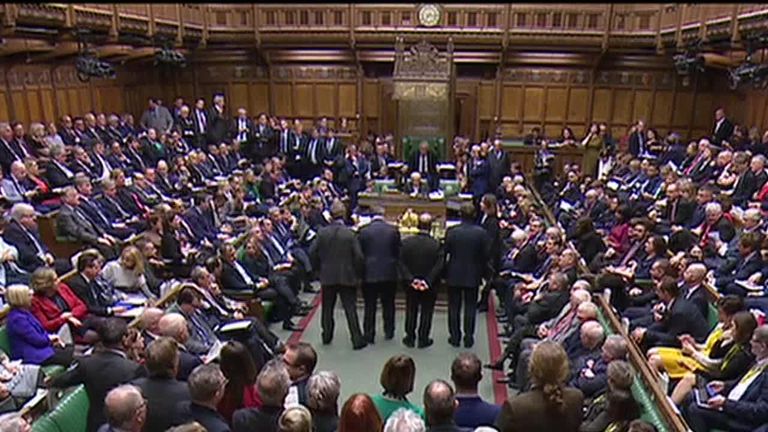How are Labour trying to block a no-deal Brexit? Will they be successful?
Jeremy Corbyn is leading a cross-party effort to seize control of the House of Commons agenda and then legislate against no deal.
Wednesday 12 June 2019 11:14, UK
Labour will today lead a cross-party effort aimed at blocking a future Conservative prime minister from pursuing a no-deal Brexit.
Jeremy Corbyn's party will use parliamentary time scheduled to them, through an opposition day debate, to try and seize control of the agenda of the House of Commons later this month.
They hope this will then allow them to introduce legislation to stop the UK leaving the EU without a divorce agreement.
:: What is a no-deal Brexit?
This phrase is used to refer to a situation whereby the UK leaves the EU without a withdrawal agreement.
Prime Minister Theresa May agreed a divorce deal with the EU, but failed three times to get enough MPs to support it in the Commons.
Boris Johnson, the frontrunner to win the Conservative leadership contest and succeed Mrs May in 10 Downing Street, is among those contenders to say he would pursue a no-deal Brexit, if the only other option was to delay Brexit again beyond 31 October.
Meanwhile, former cabinet minister Esther McVey is championing a "clean" Brexit without Mrs May's withdrawal agreement, while her fellow Tory leadership candidate Andrea Leadsom is calling for a "managed" exit from the EU, again without the current divorce deal.
:: How will Labour's plan work?
Labour will introduce a motion during this afternoon's opposition day debate, from around 1pm, which seeks to seize control of the Commons timetable on 25 June.
The Commons timetable is usually controlled by the government, making such action unusual.
Labour's motion is also supported by SNP Westminster leader Ian Blackford, Liberal Democrat leader Sir Vince Cable, Plaid Cymru Westminster leader Liz Saville-Roberts, Green Party MP Caroline Lucas and, notably, former Conservative cabinet minister Sir Oliver Letwin.
MPs will vote on whether to support Labour's proposal at the end of the debate, which could be around 2.30pm.
Sir Oliver's support could attract other Conservative MPs opposed to a no-deal Brexit to back the opposition motion.
He was involved in a previous backbench effort that successfully blocked a no-deal Brexit before the last Brexit deadline on 12 April.
If successful with this current plan, Labour would then use their control of the Commons agenda on 25 June to bring forward legislation to prevent a no-deal Brexit on 31 October, at which point the latest extension to the Article 50 negotiating period ends.
:: Listen to Any Other Business on , , and
Labour also say they will attempt to prevent a future Conservative prime minister from temporarily suspending parliament, if they want to push through a no-deal Brexit against the wishes of a majority of MPs.
Tory leadership candidate Dominic Raab has refused to rule out proroguing parliament if he becomes prime minister, in order to enact the UK's exit from the EU without the backing of the Commons.
:: Why is Labour's plan controversial?
Nikki da Costa, who was previously Downing Street's head of legislative matters, claimed it is "extraordinary" for Labour to try and seize control of the Commons agenda through lifting "standing orders" - parliament's rules - through an opposition day debate.
She suggested it has never been done before, meaning the Commons' Speaker John Bercow may have to make a ruling on whether he will permit the Labour plan.
However, Mr Bercow, who backed Remain at the 2016 EU referendum, has previously been sympathetic to MPs seeking to block a no-deal Brexit and allowed their efforts.
:: Will they be successful?
Sir Oliver's successful effort in April, co-led by Labour backbencher Yvette Cooper, to block a no-deal Brexit passed the Commons by just one vote.
It means it is far from certain that Labour's similar attempt this time round will be successful, even though a majority of MPs have consistently voted against the principle of a no-deal Brexit.
Those Tory MPs who rebelled against the government and voted for the Cooper-Letwin legislation in April might not want to do so again and therefore blot their copy book with any future Conservative leader.
Tory Brexiteer Steve Baker warned his colleagues: "Colluding with this Labour leadership to deny government control of the Commons business is unconscionable for being firmly against the national interest."








